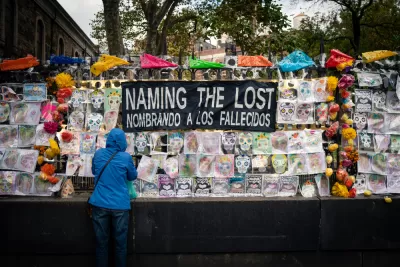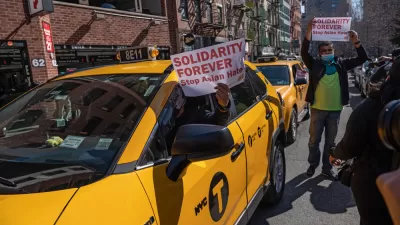Planetizen shares the latest in a series of compendia tackling the effects of the pandemic, now and in the future, for cities and communities.

Just because many of the worst-case scenarios imagined at the beginning of the pandemic haven't happened yet, doesn't mean they never will. In fact, there's plenty of evidence that despite the many threats that still lurk unrealized, many facts of the coronavirus are worse than imagined. Nine months after the first lockdowns were implemented in California, infections and hospitalizations are higher than ever, for example. There is no mistaking that the public health crisis has reached a new pitch, as hospitals burst beyond capacity, infection rates skyrocket, and someone dies of coronavirus every minute in the United States.
The fact that the fall has surpassed the warnings about what would happen when people started to let their guard down is a startling reminder of how ill-equipped we are to handle crises despite having so much evidence and experience of their inevitability.
Ready to pile on to the disaster, the invoice is coming due for many of the crises that have so far managed to fall short of constant dire warnings and doomsday predictions. Transit agencies are on the brink of disaster—which would be a disaster for the economy and the environment, at least, as well as for society as a whole. Unemployed renters are piling up debt in numbers previously possible only by owing money to health insurance providers and institutions of higher education. People are buying cars and moving to auto-dependent locations in a massive wave, locking in carbon emissions for the next generation. We'll be quantifying the effects of the pandemic for years and decades to come—and there will be no vaccine for these catastrophes.
Planetizen has been tracking the stories that have attempted to make sense of the world during the pandemic, and how the pandemic might alter the future direction of communities. Many of the themes have repeated, with only slight variations as the coronavirus has revealed its effects for public health, the economy, and society.
- Coronavirus and the Future of Cities: A Final Pre-Election Tour of the Issues (November 2020)
- Do We Know Any More About the Future of Cities Than We Did in April 2020? (October 2010)
- The Media Can't Stop Talking About the End of Cities (August 2020)
- The Great Debate: Will the Pandemic Alter the Course of Urbanism? (July 2020)
- Debating the Future of Cities After the Coronavirus, Volume 3 (June 2020)
- Density Debate Rages Alongside the Pandemic (April 2020)
- Debating the Future of Cities, and Urban Density, After the Pandemic (March 2020)
- Coronavirus and Urbanism (Planetizen Tag)
- Coronavirus and Transportation (Planetizen Tag)
- Coronavirus and Density (Planetizen Tag)
Later this month, we'll provide a more detailed survey of the themes and trends that have emerged as most relevant and influential to planning and allied professions of urban design and environmental protection. In the meantime, here is the latest collection of stories, mostly written since the U.S. election on November 3, on the great unanswered question of the year: What does the pandemic mean for the future of cities and communities?
Status Check
- Back rent in California nearing $1.7 billion, Fed study finds (The Orange County Register, November 12)
- Many U.S. stores will close forever. That’s a good thing (Fast Company, November 10)
- Infections and evictions are intertwined in Chelsea (Boston Globe, November 18)
- Food lines, late payments, falling incomes; As COVID cases surge in Dallas and Texas, so do signs of economic distress (The Dallas Morning News, November 20, Paywall)
- 'Seriously Delinquent' Mortgages Explode, But Don't Expect a Great Recession-Style Meltdown (Planetizen, November 25)
- Delinquent Homeowners in Neighborhoods of Color Are Less Likely to Be Protected by Forbearance (Urban Institute, December 2)
- The rise in murders in the US, explained (Vox, December 2)
- Aid for Phoenix area renters running out as end to federal eviction ban looms (Arizona Republic, December 2)
- Logging in to get kicked out: Inside America’s virtual eviction crisis (MIT Technology Review, December 2)
- Evictions Caused 433,700 Excess Covid Infections, 10,700 Deaths, Study Says (Planetizen, December 4)
- Millions of Americans are heading into the holidays unemployed and over $5,000 behind on rent (The Washington Post, December 7)
- Restaurant Closings Top 110,000 With Industry in ‘Free Fall’ (Bloomberg CityLab, December 7)
Urban Exodus or Urban Revival
- Increased demand for homes is the new normal says LGI Homes after record quarter (Houston Chronicle, November 3)
- At Post Office Square, a skyscraper transforms while office workers aren’t looking (Boston Globe, November 5)
- Apartment Rents Are Dropping Faster in New York City Than the Suburbs (Globe St., November 10, Paywall)
- This Couple Traded a House in the Suburbs for a DC Apartment *Because* of the Pandemic (Washingtonian, November 10)
- Falling rents, a result of pandemic, lure bargain hunters back to S.F. (San Francisco Chronicle, November 13)
- Tech hubs see falling rent as coronavirus pandemic drags on (Inman, November 13, paywall)
- While construction continues, the D.C. luxury rental market has crashed (The Washington Post, November 16)
- Rent prices are up in Houston as they’ve fallen in many US cities amid the pandemic (Kinder Institute for Urban Research, November 17)
- It’s Not Your Imagination: Manhattan Rents Really Have Fallen a Lot (Curbed, November 16)
- House prices rise as Covid sparks rural relocation (BBC, November 18)
- Renters are no longer prioritizing proximity to a transit stop when looking for a home (Crain's New York Business, December 7, Paywall)
The Future of Transportation
- Straphangars need Washington's help (Crain's New York Business, November 13, Paywall)
- NYC Commuters Could Be Spared Worst Transit Cuts With These Ideas (NY 1, November 16)
- Opinion: The Problem with Drive-In Services — Now and After COVID-19 (Transfers, November 19)
- Severe Transit Cuts Would Cripple U.S. Economy, Experts Warn (Bloomberg City Lab, November 19)
- Will Toronto still need those transit megaprojects after COVID-19? (Toronto Star, November 29)
- SFMTA prepares for massive potential layoffs as budget crisis continues to build (San Francisco Examiner, November 30)
- New York’s Streets Have Brought Relief. Imagine Them Post-Pandemic. (The New York Times, November 30)
- The Covid Pandemic Could Cut Business Travel by 36%—Permanently (The Wall Street Journal, December 1, Paywall)
- Why our reliance on cars could start booming (BBC, December 2)
- Federal Relief Proposals Aren’t Enough to Thwart Some of the Worst Transit Cuts (Bloomberg CityLab, December 3)
- Big City Conundrum: How to Persuade People to Ride the Subway (The Wall Street Journal, December 4, 2020, Paywall)
- $1B in potential Florida transportation budget cuts could defer Westshore interchange and I-275 improvements (Tampa Bay Business Journal, December 5)
- ‘Existential Peril’: Mass Transit Faces Huge Service Cuts Across U.S. (The New York Times, December 6)
The Future of Planning
- What the Pandemic Tells Us about How to Plan Cities (The Tyee, October 19)
- Entrepreneurship Is the Vaccine for Urban Economies (Bloomberg CityLab, October 21)
- New kind of restaurant emerges after COVID decimates Houston dining scene (Houston Chronicle, November 2)
- If Restaurants Go, What Happens to Cities? (The New York Times, November 3)
- A Small City Comeback, Interrupted (Bloomberg CityLab, November 5)
- The pandemic worsened America’s housing crisis. Here’s how Biden can help (Fast Company, November 9)
- COVID initiatives likely to become permanent (Santa Monica Daily Press, November 9)
- New urban design in the post-pandemic era (Congress for the New Urbanism, November 11)
- Hope for the Best, Plan for the Worst: Addressing the Aftermath Of The COVID-19 Pandemic In America’s Struggling Neighborhoods (Center for Community Progress, November 13)
- After COVID, A Bright Future For American Cities (The American Conservative, November 13)
- The urban cure: How cities seize opportunity from the pandemic crisis to change how they operate for the better (The Globe and Mail, November 14, Paywall)
- How to make sure winter is welcoming in the time of COVID (San Francisco Chronicle, November 15)
- Green wave: How Canadian cities are creating new park space (The Globe and Mail, November 16)
- Why Europe Is Slowing Down (November 18, CityLab Bloomberg)
- Local Policies Can Protect Commercial Corridors as the Pandemic Continues (November 19)
- Offices and Malls Will Look Different After Covid-19 (The Wall Street Journal, November 26, Paywall)
- The Indoorification of Outdoor Dining (Bloomberg CityLab, November 27)
- Can Gavin Newsom use the pandemic to beat back homelessness? (Cal Matters, November 30)
- Outdoor Dining Is a Hit. What About Outdoor Shopping? (The New York Times, December 2)

Planetizen Federal Action Tracker
A weekly monitor of how Trump’s orders and actions are impacting planners and planning in America.

Chicago’s Ghost Rails
Just beneath the surface of the modern city lie the remnants of its expansive early 20th-century streetcar system.

San Antonio and Austin are Fusing Into one Massive Megaregion
The region spanning the two central Texas cities is growing fast, posing challenges for local infrastructure and water supplies.

Since Zion's Shuttles Went Electric “The Smog is Gone”
Visitors to Zion National Park can enjoy the canyon via the nation’s first fully electric park shuttle system.

Trump Distributing DOT Safety Funds at 1/10 Rate of Biden
Funds for Safe Streets and other transportation safety and equity programs are being held up by administrative reviews and conflicts with the Trump administration’s priorities.

German Cities Subsidize Taxis for Women Amid Wave of Violence
Free or low-cost taxi rides can help women navigate cities more safely, but critics say the programs don't address the root causes of violence against women.
Urban Design for Planners 1: Software Tools
This six-course series explores essential urban design concepts using open source software and equips planners with the tools they need to participate fully in the urban design process.
Planning for Universal Design
Learn the tools for implementing Universal Design in planning regulations.
planning NEXT
Appalachian Highlands Housing Partners
Mpact (founded as Rail~Volution)
City of Camden Redevelopment Agency
City of Astoria
City of Portland
City of Laramie






























